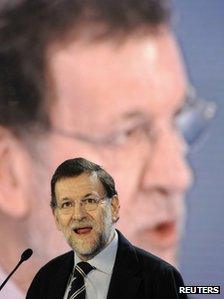Spanish fears expose eurozone cracks
- Published
- comments

Mr Rajoy will present Spain's 2012 budget on Friday
Suddenly the focus is on Spain. Many eurozone ministers and officials have since the new year wanted to sell the story that the worst of the eurozone crisis lies in the past.
Occasionally cracks appear in the narrative.
At the weekend, the EU's Economics Commissioner Olli Rehn conceded that the situation in Spain was "fragile".
It caused considerable irritation in Madrid when Italian Prime Minister Mario Monti weighed in to say Spain was causing "big concern". The Spanish felt a crisis was being talked up.
The central question for Spain is this: has it reached the limits to what austerity can achieve? The fear in government circles is that to push further with spending cuts will tip the country into a cycle of decline.
There is, without doubt, risk to what is being attempted. The government of Mariano Rajoy is committed to cutting the deficit to 5.3% this year, less than had been originally agreed with the EU, but still a cut.
Further austerity is coming at a time when unemployment is at almost 23% and rising. The economy will contract by at least 1.7% this year, perhaps more. House prices are still falling and the debt carried by Spain's banks is still causing concern.
When the Spanish government later this week presents its budget for 2012 it will almost certainly have to push for cuts in education and health care. On Thursday there is a general strike although it is questionable how much support it will get.
The problem for Brussels is that so much has been staked on that commits countries to meet targets to reduce deficits.
Olli Rehn, at the weekend, was offering no concessions. "Spain," he said, "needs to stick to its targets in order to avoid any setbacks in terms of its borrowing costs".
What happens to Spain will determine whether the eurozone is just enjoying a pause in its crisis. It will determine too whether the German-led austerity culture will save Europe or drive parts of it into a long period without growth.
The Italians fear economic contagion from Spain
Italy, this year, has managed to de-couple itself from Spain. Its Prime Minister, Mario Monti, has been given high marks for bringing responsibility to the Italian economy.
His comments about Spain reflect the fact that last week Italy's borrowing costs began edging up again. The Italians feared contagion from Spain.
Privately, the Spanish believe that Mario Monti has got a bit carried away by all the good publicity. He has been feted in European capitals.
An Italian commentator, Massimo Franco, said that "Monti did the negotiations more with an eye on Europe than to Italy". At times, he seems more like the EU commissioner he once was rather than Italy's prime minister.
The real tests for Italy lie ahead. So far the government has failed to reach agreement with the labour unions on making it easier to hire and fire and open up the labour market.
Those proposals are likely to be put directly to parliament. Their passage is not certain. Italy has a history of watering down measures that might make the country more competitive.
All the indications are that Italy too will remain in recession this year. Its unemployment rate is rising and its debt to GDP ratio remains around 120%. The main union is implacably opposed to the reforms. Mario Monti's biggest challenge is at home.
These two economies are the key to the eurozone crisis. All the signs are that German opposition to boosting the size of the bailout fund is weakening.
Other member states have been pushing to combine with the permanent rescue mechanism, .
That will be the focus of a meeting in Copenhagen at the weekend.
The hope is to have what is called a firewall of 750 billion euros at the very least.